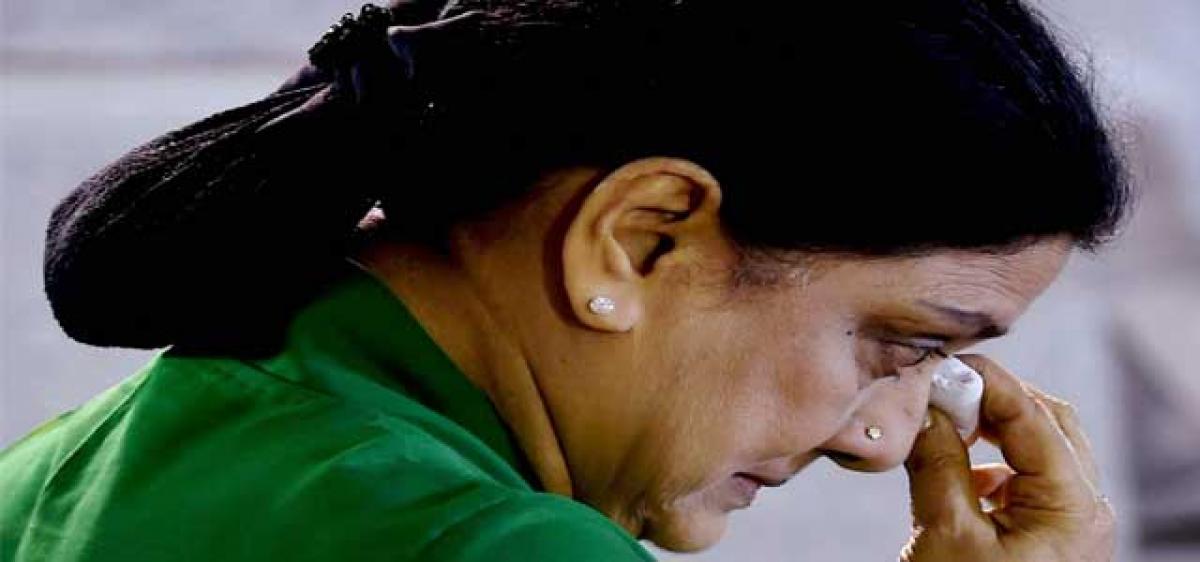Live
- Over 7,600 Syrians return from Turkiye in five days after Assad's downfall: minister
- Delhi BJP leaders stay overnight in 1,194 slum clusters
- Keerthy Suresh and Anthony Thattil Tie the Knot in a Christian Ceremony
- AAP, BJP making false promises to slum dwellers for votes: Delhi Congress
- 'Vere Level Office' Review: A Refreshing Take on Corporate Life with Humor and Heart
- Libya's oil company declares force majeure at key refinery following clashes
- Illegal Rohingyas: BJP seeks Assembly session to implement NRC in Delhi
- Philippines orders full evacuation amid possible volcanic re-eruption
- Government Prioritizes Welfare of the Poor, says Dola Sri Bala Veeranjaneyaswamy
- Two Russian oil tankers with 29 on board damaged due to bad weather
Just In

In a major setback for AIADMK general secretary VK Sasikala, who was aspiring to be the Tamil Nadu Chief Minister, the Supreme Court on Tuesday restored her conviction and four-year jail sentence in a disproportionate assets (DA) case.
New Delhi/Chennai: In a major setback for AIADMK general secretary VK Sasikala, who was aspiring to be the Tamil Nadu Chief Minister, the Supreme Court on Tuesday restored her conviction and four-year jail sentence in a disproportionate assets (DA) case.
The apex court upheld the four-year jail term handed down by a lower court in Bengaluru and banned her from seeking elected office for 10 years. But Sasikala is unlikely to surrender before the Bengaluru court on Tuesday.
Earlier in the day, the two-judge Supreme Court bench of Justice Pinaki Chandra Ghose and Justice Amitava Roy set aside the May 11, 2015 Karnataka High Court order acquitting Sasikala, her two relatives and late Tamil Nadu Chief Minister J Jayalalithaa.
The immediate fallout of the top court verdict is that Sasikala cannot contest elections for 10 years. She faces four years in incarceration and later six years of disqualification under the Representation of People's Act after her release.
Restoring the conviction and sentencing by the trial court in "full including the consequential directions", the Bench ordered the trial court to take "immediate steps to ensure" that Sasikala, Sudhakaran and Elavarasi "serve out the remainder of the sentence awarded to them and take further steps in compliance with this judgment."
The court said that the three would surrender before the trial court "forthwith". Speaking for the Bench, Justice Ghose commended the trial court for being "meticulous, sensitive, vigilant and judicious in its appraisal ..." and that "we are of the unhesitant opinion" that the High Court judgment and order "suffers from manifest errors on the face of the record, both on facts and in law and is liable to be set aside".
Justice Roy, in a concurring judgment, expressed deep concern over the "escalating menace of corruption in society". The court said that every transaction that was taking place was in the know of each one of them living under the same address.
"The unimpeded, frequent and spontaneous inflow of funds" from the account of Jayalalithaa to those of the "other co-accused and the firms/companies involved, overwhelmingly demonstrate" their "collective culpable involvement" in the transactions ... "the same to be masked banking exchanges though involving several accounts but mostly of the same bank", the court said.
"It is true that in course of the investigation, some documents had been seized which were not adduced in evidence being construed to be irrelevant for substantiating the charge, but it did not certainly tantamount to suppression thereof so as to afflict the trial with the vice of unfairness and non-transparency as alleged," the court said.
It also rejected the "oft-repeated grievance" of the accused that the trial court had left out of consideration material pieces of evidence brought by it, saying "suffice it to state that the decision rendered by it proclaim to the contrary".
"In all the aspects among others, income, expenditure and assets, the judgment of the trial court reveals on a plain reading that the evidence adduced by the defence as construed to be relevant had not only been taken note of but also analysed and applied for arriving at the conclusions on the issues pertaining to the adjudication," it said in its judgment.
Upholding the trial court directing confiscation of the movable and immovable assets of the accused, as well of properties of six companies owned by the accused, to recover the fine imposed on them, the top court said: "In our comprehension, the course adopted by the trial court cannot be faulted with."
"We are of the opinion that the order of confiscation/ forfeiture of the properties standing in the name of six companies, as involved, made by the trial court is unexceptionable."
The top court verdict came on an appeal of the Karnataka government that had challenged the state High Court verdict acquitting Jayalalithaa, Sasikala and the two in the case relating to amassing disproportionate assets to the tune of Rs 66.65 crore during Jayalalithaa's first term as Chief Minister from 1991-1996.

© 2024 Hyderabad Media House Limited/The Hans India. All rights reserved. Powered by hocalwire.com







